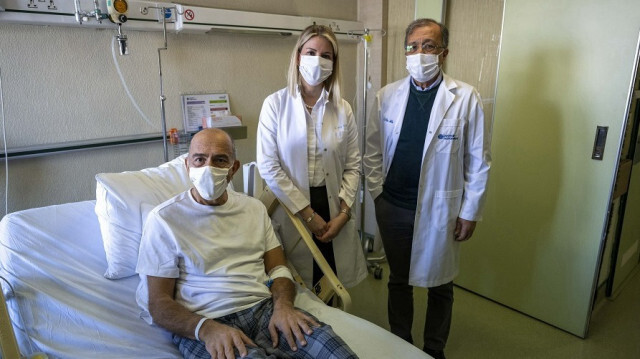
Team of 15 doctors successfully administer chemosaturation, involving high-dose chemotherapy, to patient with liver cancer
Turkish doctors have helped a terminally diagnosed British liver cancer patient hold on to life with the a rare method of treatment called "chemosaturation."
The team of 15 doctors in the Turkish capital Ankara successfully administered the method, involving high-dose chemotherapy, to the patient's liver.
Speaking to Anadolu, Dr. Okan Akhan who heads Radiology at the Bayindir Sogutozu Hospital, said 62-year-old Nader Farahnak, who lives in the UK, sought their help two months ago.
After a series of radiological tests, Akhan's team decided that chemosaturation was the right way to go for Farahnak who was diagnosed with malignant melanoma, or skin cancer, that had spread to his liver.
Akhan said the patient had a large number of cancerous cell spreads in his liver and did not respond to other treatments, such as radiofrequency therapy and immunotherapy.
"Chemosaturation is an interventional radiological technique, and catheters are placed in the patient's large vein in both the groin and neck region."
Describing the method in detail, Akhan said the chemotherapy drug is sent directly to the liver through a special catheter.
As the operation takes approximately three hours, he said, it is administered to patients who have no other treatment options.
- Lengthens life of patients
Akhan stressed that chemosaturation, a rare treatment both in Türkiye and the rest of the world, has been scientifically demonstrated to be the most effective method in treating liver metastases of malignant melanoma, adding that it can also be applied to breast cancer patients with similar metastases.
"The main purpose of the procedure is to help the patient the live longer and improve their quality of life. It doesn't fully cure the cancer," he said.
Farahnak is currently in good condition and morale, Akhan noted, adding that Farahnak would likely be discharged and return home at the beginning of next week.
Medical Oncology Coordinator Dr. Ece Esin also said chemosaturation was a new treatment method that amounts to "saturating the liver with chemotherapy."
"While we used to give our patients days and weeks to live, now we can administer treatments that provide a long life expectancy and much less side effects," said Esin.
She added: "Our patient was diagnosed from the cerebral cortex three-and-a-half years ago, and is one of the rare cases in the medical literature."
She noted that the disease appeared only in the cerebral cortex, and immunotherapy started in the UK but the disease relapsed in the liver, causing widespread metastases.
"When our patient came to us, there was no other treatment option. The chemosaturation implemented last week was completed very successfully. We will continue with immunotherapy in the next period, it will be under our constant control," she said.
Farahnak, who has a grandchild and two daughters, thanked his Turkish doctors, praising the efficiency of the care he received and the speed of the system in Türkiye.
Compared to this, such processes in Britain progress very slowly, he said. "Because, obviously the liver is worsening, my feeling was that I needed to go somewhere where I could actually get an efficient way of dealing with the problem and having the chemosaturation."
"I'm not at all disappointed. It's been brilliant. I would recommend it to anyone."

